
Maafa
Encyclopedia
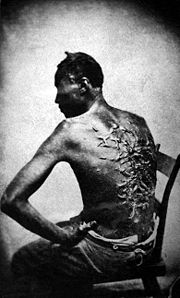
Black people
The term black people is used in systems of racial classification for humans of a dark skinned phenotype, relative to other racial groups.Different societies apply different criteria regarding who is classified as "black", and often social variables such as class, socio-economic status also plays a...
and the African diaspora
African diaspora
The African diaspora was the movement of Africans and their descendants to places throughout the world—predominantly to the Americas also to Europe, the Middle East and other places around the globe...
, through slavery
Slavery
Slavery is a system under which people are treated as property to be bought and sold, and are forced to work. Slaves can be held against their will from the time of their capture, purchase or birth, and deprived of the right to leave, to refuse to work, or to demand compensation...
, imperialism, colonialism, invasion, oppression, dehumanization and exploitation. The terms also refer to the social and academic policies that were used to invalidate or appropriate the contributions of African peoples to humanity as a whole, and the residual effects of this persecution, as manifest in contemporary society. The term Maafa is derived from the Swahili
Swahili language
Swahili or Kiswahili is a Bantu language spoken by various ethnic groups that inhabit several large stretches of the Mozambique Channel coastline from northern Kenya to northern Mozambique, including the Comoro Islands. It is also spoken by ethnic minority groups in Somalia...
term for disaster
Disaster
A disaster is a natural or man-made hazard that has come to fruition, resulting in an event of substantial extent causing significant physical damage or destruction, loss of life, or drastic change to the environment...
, terrible occurrence or great tragedy
Tragedy (event)
A tragedy is an event in which one or more losses, usually of human life, occurs that is viewed as mournful. Such an event is said to be tragic....
, while the term African Holocaust, derived from a Greek word meaning sacrificial burning, is preferred by other scholars to emphasize the intentional character.
While Maafa can be considered an area of study within African history in which both the actual history and the legacy of that history are studied as a single discourse, it can also be taken as its own significant event in the course of global or world history. When studied as African history, the paradigm emphasizes the legacy of the African Holocaust on African people
African people
African people refers to natives, inhabitants, or citizen of Africa and to people of African descent.-Etymology:Many etymological hypotheses that have been postulated for the ancient name "Africa":...
s globally. The emphasis in the historical narrative is on African agents, in opposition to what is perceived to be the conventional Eurocentric voice; for this reason Maafa is an aspect of Pan-Africanism
Pan-Africanism
Pan-Africanism is a movement that seeks to unify African people or people living in Africa, into a "one African community". Differing types of Pan-Africanism seek different levels of economic, racial, social, or political unity...
.
Usage of the term Maafa to describe this period of persecution was popularized by Professor Marimba Ani
Marimba Ani
Marimba Ani is an anthropologist and African Studies scholar best known for her work Yurugu, a comprehensive critique of European thought and culture, and her coining of the term Maafa for the African holocaust.-Life and Work:...
's 1994 book Let the Circle Be Unbroken: The Implications of African Spirituality in the Diaspora. Historically, the enslavement of Africans by white people was mostly referred to as the Atlantic slave trade
Atlantic slave trade
The Atlantic slave trade, also known as the trans-atlantic slave trade, refers to the trade in slaves that took place across the Atlantic ocean from the sixteenth through to the nineteenth centuries...
, a phrase that has been criticized for emphasizing the commercial aspects of the African persecution, in keeping with a Europe
Europe
Europe is, by convention, one of the world's seven continents. Comprising the westernmost peninsula of Eurasia, Europe is generally 'divided' from Asia to its east by the watershed divides of the Ural and Caucasus Mountains, the Ural River, the Caspian and Black Seas, and the waterways connecting...
an or European-American historiographical viewpoint.
Beyond slavery
The Maafa or African Holocaust morally distinguishes domestic slavery in Africa from the commercial ventures of the European and Arab trade in captive Africans, focusing on the consequences and legacy of these foreign interventions in Africa. The term is not limited to demographic significance, in the aggregate population losses, but also references the profound changes to settlement patterns, epidemiological exposure and reproductive and social development potential.In terms of legacy, the Maafa also includes the academic and social forces which categorized Africans into color labels, and the ramifications of this economic, social, political, and legal disenfranchisement, as manifest in contemporary society.
Curse of Ham
The "curse of Ham" was one moral rationalization underlying the slave trade. The curse of Ham interpretation of the Bible stems from , which relates the story of NoahNoah
Noah was, according to the Hebrew Bible, the tenth and last of the antediluvian Patriarchs. The biblical story of Noah is contained in chapters 6–9 of the book of Genesis, where he saves his family and representatives of all animals from the flood by constructing an ark...
's family, soon after the flood. Noah declares of Ham's son Canaan, "Cursed be Canaan; a servant of servants shall he be unto his brethren." Because Ham's sons and their descendants were believed by biblical genealogists to be the people of Africa, these readings of the Bible also assumed that Ham must have been "born black... contrary to the common dictation of nature." This explanation of biblical events also helped to account for the origins of dark-skinned people.
This reading of biblical scripture was far from universal. One 19th century critic suggested that, even if this tenuous theory of a curse were legitimate, the cursed children of Ham were as likely to be European as African, except in the "oblique and sinister and not very generous bearing...in the pro-slavery mind."
The equating of blackness with darkness of the soul has been traced back to antiquity, with some historians finding such thinking in the thought of, for instance, Philo
Philo
Philo , known also as Philo of Alexandria , Philo Judaeus, Philo Judaeus of Alexandria, Yedidia, "Philon", and Philo the Jew, was a Hellenistic Jewish Biblical philosopher born in Alexandria....
and Origen
Origen
Origen , or Origen Adamantius, 184/5–253/4, was an early Christian Alexandrian scholar and theologian, and one of the most distinguished writers of the early Church. As early as the fourth century, his orthodoxy was suspect, in part because he believed in the pre-existence of souls...
. In the Middle Ages
Middle Ages
The Middle Ages is a periodization of European history from the 5th century to the 15th century. The Middle Ages follows the fall of the Western Roman Empire in 476 and precedes the Early Modern Era. It is the middle period of a three-period division of Western history: Classic, Medieval and Modern...
, European scholars of the Bible picked up on the Talmud
Talmud
The Talmud is a central text of mainstream Judaism. It takes the form of a record of rabbinic discussions pertaining to Jewish law, ethics, philosophy, customs and history....
ic idea of viewing the "sons of Ham" or "Hamites
Hamitic
Hamitic is an historical term for the peoples supposedly descended from Noah's son Ham, paralleling Semitic and Japhetic.It was formerly used for grouping the non-Semitic Afroasiatic languages , but since, unlike the Semitic branch, these have not been shown to form a phylogenetic unity, the term...
" as cursed, possibly "blackened" by their sins. Though early arguments to this effect were sporadic, they became increasingly common during the slave trade of the 18th and 19th centuries, when it began to be used as a justification or rationalization of slavery, to suit the economic and ideological interests of the elite.
Historians believe that by the 19th century, the belief that blacks were descended from Ham was used by European-Americans in the southern United States
Southern United States
The Southern United States—commonly referred to as the American South, Dixie, or simply the South—constitutes a large distinctive area in the southeastern and south-central United States...
to justify slavery. According to Benjamin Braude, the curse of Ham became "a foundation myth for collective degradation, conventionally trotted out as God's reason for condemning generations of dark-skinned peoples from Africa to slavery."
Slavery in Africa
Aspects of the slave trade were controlled by indigenous Africans themselves. Several African nations such as the Ashanti of Ghana and the YorubaYoruba people
The Yoruba people are one of the largest ethnic groups in West Africa. The majority of the Yoruba speak the Yoruba language...
of Nigeria had economies depending solely on the trade. African peoples such as the Imbangala of Angola and the Nyamwezi of Tanzania would serve as intermediaries or roving bands warring with other African nations to capture Africans for Europeans. Europeans would actively favor one African group over another to deliberately ignite chaos and continue their slaving activities.
European slave trade
This system of enslavement was held to reflect a divine ethno-social dynamic, placing whites as masters above blacks as slaves. There was the presumption of a divine legitimacy in the corporeal system of subjugation and oppression, a system which was motivated and maintained by greed and ignorance and only excused with Christianity, and sometimes even with the idea of, to some extent, Christianizing a "heathen" people. Some defenders of slavery in the United States' South in the antebellum period, for instance, argued that blacks in the United States were becoming "elevated, from the degrading slavery of savage heathenism to the participation in civilization and Christianity".Christian belief became the context for the prevalence of European culture, European names became Christian names and those who adopted or were forced into Christianity automatically adopted European culture in an attempt to become more "Christian".
Arab slave trade
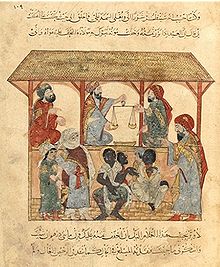
Patrick Manning (Professor)
Patrick Manning is the Andrew W. Mellon Professor of World History at the University of Pittsburgh. He is also president of the World History Network, Inc., a nonprofit corporation fostering research in world history...
, a professor of World History. Many Arabs were Christian, Jewish and also indigenous Arab faiths. Furthermore, usage of the terms "Islamic trade" or "Islamic world" implicitly and erroneously treats Africa as it were outside of Islam, or a negligible portion of the Islamic world. Dr. Kwaku Person-Lynn points out that the Arab trade was rarely a chattel trade and some argue more "humane." In both African Slavery and Arab enslavement of Africans, the enslaved were allowed great social ascension.
In the 8th century Africa
Africa
Africa is the world's second largest and second most populous continent, after Asia. At about 30.2 million km² including adjacent islands, it covers 6% of the Earth's total surface area and 20.4% of the total land area...
was dominated by Arab
Arab
Arab people, also known as Arabs , are a panethnicity primarily living in the Arab world, which is located in Western Asia and North Africa. They are identified as such on one or more of genealogical, linguistic, or cultural grounds, with tribal affiliations, and intra-tribal relationships playing...
-Berbers
Berber people
Berbers are the indigenous peoples of North Africa west of the Nile Valley. They are continuously distributed from the Atlantic to the Siwa oasis, in Egypt, and from the Mediterranean to the Niger River. Historically they spoke the Berber language or varieties of it, which together form a branch...
in the north: Islam moved southwards along the Nile
Nile
The Nile is a major north-flowing river in North Africa, generally regarded as the longest river in the world. It is long. It runs through the ten countries of Sudan, South Sudan, Burundi, Rwanda, Democratic Republic of the Congo, Tanzania, Kenya, Ethiopia, Uganda and Egypt.The Nile has two major...
and along the desert trails. The Solomonic dynasty
Solomonic dynasty
The Solomonic dynasty is the Imperial House of Abyssinia. Its members claim lineal descent from King Solomon and the Queen of Sheba, the latter of whom tradition asserts gave birth to the first King Menelik I after her Biblically described visit to Solomon in Jerusalem .-Overview:The dynasty, a...
of Ethiopia
Ethiopia
Ethiopia , officially known as the Federal Democratic Republic of Ethiopia, is a country located in the Horn of Africa. It is the second-most populous nation in Africa, with over 82 million inhabitants, and the tenth-largest by area, occupying 1,100,000 km2...
often exported Nilotic
Nilotic
Nilotic people or Nilotes, in its contemporary usage, refers to some ethnic groups mainly in South Sudan, Uganda, Kenya, and northern Tanzania, who speak Nilotic languages, a large sub-group of the Nilo-Saharan languages...
slaves from their western borderland provinces, or from newly conquered or reconquered Muslim provinces. Native Muslim Ethiopian sultanates (rulership) exported slaves as well, such as the sometimes independent sultanate (rulership) of Adal
Adal Sultanate
The Adal Sultanate or the Kingdom of Adal was a medieval multi-ethnic Muslim state located in the Horn of Africa.-Overview:...
(a 16th century province-cum-rulership located in East Africa north of Northwestern Somalia). The Arab (African identifying as Arab) Tippu Tib extended his influence and made many people slaves. After Europeans had settled in the Gulf of Guinea
Gulf of Guinea
The Gulf of Guinea is the northeasternmost part of the tropical Atlantic Ocean between Cape Lopez in Gabon, north and west to Cape Palmas in Liberia. The intersection of the Equator and Prime Meridian is in the gulf....
, the trans-Saharan slave trade became less important. In Zanzibar, slavery was abolished late, in 1897, under British-controlled Sultan Hamoud bin Mohammed
Hamoud bin Mohammed of Zanzibar
Sayyid Sir Hamoud bin Mohammed Al-Said, GCSI, was the British-controlled Omani sultan of the protectorate of Zanzibar, who outlawed slavery on the island....
. The rest of Africa had no direct contact with Muslim slave-traders.
The primary boom of the trade in African slaves by Arabs was during the 18th century. The Portuguese had destroyed the Swahili coast and Zanzibar emerged as the hub of wealth for the Arabian state of Muscat. By 1839, slaving became the prime Arab enterprise. The demand for slaves in Arabia, Egypt, Persia and India, but more notability by the Portuguese who occupied Mozambique, created a wave of destruction on Eastern Africa. 45,000 slaves were passing through Zanzibar every year.
Legacy of Arab enslavement of Africans
Islam like Christianity became the context for the cultural prevalence of Arab culture. Arab names became Islamic names and those who adopted Islam automatically adopted Arab culture in an attempt to become "Islamic." The Afro-Arab relationship was riddled with complexities and nuance. Some Arabs were Arab linguistically but racially African. Thus, the Arab trade in enslaved Africans was not only conducted by Asiatic Arabs, but also African Arabs: Africans speaking Arabic as a first language embracing an Arab culture.Scholarship on Arab slavery has historically been limited, because most people who know themselves to have had enslaved ancestors are people of the African Diaspora whose ancestors were involved in the Transatlantic slave trade. The impact of the Arab trade on people of the Americas
Americas
The Americas, or America , are lands in the Western hemisphere, also known as the New World. In English, the plural form the Americas is often used to refer to the landmasses of North America and South America with their associated islands and regions, while the singular form America is primarily...
was negligible. Another reason why the Arab Slave Trade is far less scrutinized than the European trade is that the social legacy of western slavery is far more salient today: in the West, ghettos of concentrated poverty, populated by a black-skinned minority, are not uncommon, nor are prison systems disproportionately incarcerating impoverished black minorities. The African Diaspora in Arab lands, on the other hand, has almost disappeared through inter-marriage. The resurgence of Islamaphobia and the need to de-focus European slaving activities, some argue, has brought this aspect of history to the foreground.
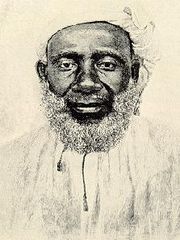
Anwar Sadat
Muhammad Anwar al-Sadat was the third President of Egypt, serving from 15 October 1970 until his assassination by fundamentalist army officers on 6 October 1981...
had to be cancelled when Sadat discovered that an African-American had been cast to play him. Sadat considered himself white, according to Moore. Moore claimed that black-looking Arabs, like many black-looking Latin Americans, often consider themselves white because they have some white ancestry. Similarly, 19th century slave trader Tippu Tip
Tippu Tip
Tippu Tip or Tib , real name Hamad bin Muḥammad bin Jumah bin Rajab bin Muḥammad bin Sa‘īd al-Murghabī, , was a Swahili-Zanzibari trader. He was famously known as Tippu Tib after an eye disease which made him blind...
is often identified as Arab
Arab
Arab people, also known as Arabs , are a panethnicity primarily living in the Arab world, which is located in Western Asia and North Africa. They are identified as such on one or more of genealogical, linguistic, or cultural grounds, with tribal affiliations, and intra-tribal relationships playing...
despite having an unmixed African mother, in part because of the Arab tradition of assigning race through paternal descent. Tip's mother was an Arab and his father was from the African Swahili coast.
Scale
There is debate that the widely accepted view of the arrival of 10 million neglects to state how many left the continent of Africa. Estimates range from 40 million to 100 million from both the Arab Slave trade and the Transatlantic trade. It has been estimated by Scholars like Karenga and Walter Rodney that the population of Africa in the mid 19th century would have been 50 million instead of 25 million had slavery not taken place. Many Africans died during capturing or deportation to the coast, in the coastal dungeons or during the middle passageMiddle Passage
The Middle Passage was the stage of the triangular trade in which millions of people from Africa were shipped to the New World, as part of the Atlantic slave trade...
. It is estimated that the Portuguese trade was underestimated by half and the British trade by 1/3. There were also indirect effects of the slavers' actions, including broken families left behind and the spreading of European diseases.
It is estimated that by the height of the slave trade the population of Africa unlike the rest of the World had stagnated by 50%. Not only was the trade of demographic significance in the aggregate population losses but also in the profound changes to settlement patterns, epidemiological exposure, and reproductive and social development potential.
Effects
Few scholars dispute the harm done to the slaves themselves, nor the legacy of social and financial alienation. African scholar Maulana Karenga puts slavery in the broader context of the Maafa, suggesting that its effects exceed mere physical persecution and legal disenfranchisement: the "destruction of human possibility involved redefining African humanity to the world, poisoning past, present and future relations with others who only know us through this stereotyping and thus damaging the truly human relations among peoples."Slavery, colonialism and racism engendered a broad array of aftereffects, which are very visible in western society. The emotional stress of societal alienation and the burden of social and economic disadvantage fall under the scope of this legacy, and Africans of the diaspora are continually "tested by the engagement with Eurocentric culture." Several scholars have suggested that black families often seem to present "symptoms of imbalance, alienation, and non-cohesion within themselves and their communities", linking this tendency to the brutal disconnect in familial tradition that slavery made, when families were arbitrarily destroyed as slaves were bought and sold. Rather than family--"community, harmony, and balance"--as a generational norm, "alienation and chaos in the wake of the Maafa seems more familiar."
The destruction of the family unit was furthered by the destruction of the institution of marriage
Marriage
Marriage is a social union or legal contract between people that creates kinship. It is an institution in which interpersonal relationships, usually intimate and sexual, are acknowledged in a variety of ways, depending on the culture or subculture in which it is found...
. Not only were slaves disallowed legal marriage and forbidden any American religious and civil proceedings, but also their tribal ceremonies were not permitted or honored. Children were not raised among their own parents, who were themselves never formally united in union; and children were often sold away. These practices born of the economics of the slave trade, in addition to undermining family traditions, were justified with arguments that dehumanized African people. Dr. Joy DeGruy Leary speaks to the "residual effects" of this prolonged campaign of dehumanization as a "collective posttraumatic stress disorder
Post Traumatic Slave Syndrome
Post Traumatic Slave Syndrome is a theory developed by Dr. Joy DeGruy. PTSS suggests that centuries of slavery followed by systemic racism and oppression have resulted in multigenerational adaptive behaviors—some of which have been positive and reflective of resilience, and others that are...
", an anxiety innate to the African American experience which is exacerbated by the barrage of statistics and studies that categorize African Americans as an "other", often seeming to revive the bigoted, dehumanizing sentiments of the past.
Economics of slavery
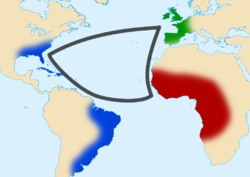
Seven Years' War
The Seven Years' War was a global military war between 1756 and 1763, involving most of the great powers of the time and affecting Europe, North America, Central America, the West African coast, India, and the Philippines...
in 1763, France agreed to cede the vast territory of New France
New France
New France was the area colonized by France in North America during a period beginning with the exploration of the Saint Lawrence River by Jacques Cartier in 1534 and ending with the cession of New France to Spain and Great Britain in 1763...
to the victors in exchange for keeping the minute Antillian island of Guadeloupe
Guadeloupe
Guadeloupe is an archipelago located in the Leeward Islands, in the Lesser Antilles, with a land area of 1,628 square kilometres and a population of 400,000. It is the first overseas region of France, consisting of a single overseas department. As with the other overseas departments, Guadeloupe...
.
Slave trade profits have been the object of many fantasies. Returns for the investors were not actually absurdly high (around 6% in France in the 18th century), but they were higher than domestic alternatives (in the same century, around 5%). Risks—maritime and commercial—were important for individual voyages. Investors mitigated it by buying small shares of many ships at the same time. In that way, they were able to diversify a large part of the risk away. Between voyages, ship shares could be freely sold and bought. All these made slave trade a very interesting investment (Daudin 2004). Historian Walter Rodney
Walter Rodney
Walter Rodney was a prominent Guyanese historian and political activist, who was assassinated in Guyana in 1980.-Career:...
estimates that by c.1770, the King of Dahomey
Dahomey
Dahomey was a country in west Africa in what is now the Republic of Benin. The Kingdom of Dahomey was a powerful west African state that was founded in the seventeenth century and survived until 1894. From 1894 until 1960 Dahomey was a part of French West Africa. The independent Republic of Dahomey...
was earning an estimated £250,000 per year by selling captive African soldiers and even his own people to the European slave-traders. Most of this money was spent on British-made firearms (of very poor quality) and industrial-grade alcohol.
Colonialism and the European scramble for Africa
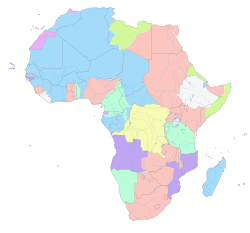
Scramble for Africa
The Scramble for Africa, also known as the Race for Africa or Partition of Africa was a process of invasion, occupation, colonization and annexation of African territory by European powers during the New Imperialism period, between 1881 and World War I in 1914...
", carving up most of the continent into colonial states. Only Liberia
Liberia
Liberia , officially the Republic of Liberia, is a country in West Africa. It is bordered by Sierra Leone on the west, Guinea on the north and Côte d'Ivoire on the east. Liberia's coastline is composed of mostly mangrove forests while the more sparsely populated inland consists of forests that open...
and Abyssinia (Ethiopia
Ethiopia
Ethiopia , officially known as the Federal Democratic Republic of Ethiopia, is a country located in the Horn of Africa. It is the second-most populous nation in Africa, with over 82 million inhabitants, and the tenth-largest by area, occupying 1,100,000 km2...
) escaped colonization. This colonial occupation continued until after World War II
World War II
World War II, or the Second World War , was a global conflict lasting from 1939 to 1945, involving most of the world's nations—including all of the great powers—eventually forming two opposing military alliances: the Allies and the Axis...
, when the colonial states gradually attained formal independence.
Colonialism
Colonialism
Colonialism is the establishment, maintenance, acquisition and expansion of colonies in one territory by people from another territory. It is a process whereby the metropole claims sovereignty over the colony and the social structure, government, and economics of the colony are changed by...
had a destabilizing effect that still resonates in African politics. Before European intervention, national borders were no real concern, as a group's territory was generally congruent with its military or trade influence. The European insistence on drawing borders around territories to isolate them from those of other colonial powers often had the effect of separating otherwise contiguous political groups, or forcing traditional enemies to live side by side with no buffer between them. For example, although the Congo River
Congo River
The Congo River is a river in Africa, and is the deepest river in the world, with measured depths in excess of . It is the second largest river in the world by volume of water discharged, though it has only one-fifth the volume of the world's largest river, the Amazon...
appears to be a natural geographic boundary, there had formerly been linguistically and culturally like groups living on each side, in mutually dependent community; border demarcation, in this case between Belgium
Belgium
Belgium , officially the Kingdom of Belgium, is a federal state in Western Europe. It is a founding member of the European Union and hosts the EU's headquarters, and those of several other major international organisations such as NATO.Belgium is also a member of, or affiliated to, many...
and France
France
The French Republic , The French Republic , The French Republic , (commonly known as France , is a unitary semi-presidential republic in Western Europe with several overseas territories and islands located on other continents and in the Indian, Pacific, and Atlantic oceans. Metropolitan France...
along the river, permanently separated such groups, undermining these societies. Africans who lived in Saharan or Sub-Saharan Africa
Sub-Saharan Africa
Sub-Saharan Africa as a geographical term refers to the area of the African continent which lies south of the Sahara. A political definition of Sub-Saharan Africa, instead, covers all African countries which are fully or partially located south of the Sahara...
, some of whom had subsisted in trading across the continent for centuries, often found themselves crossing borders that existed only on European maps.
European intervention often undermined the local balance of power
Balance of power in international relations
In international relations, a balance of power exists when there is parity or stability between competing forces. The concept describes a state of affairs in the international system and explains the behavior of states in that system...
, creating ethnic conflict where it was previously nonexistent, now that territorial boundaries were artificially redrawn by outsiders. Peoples of like ethnicity, religion, and language were often separated by virtue of having been conquered by different European states; the states themselves often grouped unlike peoples together, such that the nascent political entities completely lacked political unity. Peoples of differing religions, ethnicities, and even languages were jumbled together according to the sphere of influence
Sphere of influence
In the field of international relations, a sphere of influence is a spatial region or conceptual division over which a state or organization has significant cultural, economic, military or political influence....
under which they happened to fall, encouraging internecine conflict and disunity.
In nations that had substantial European populations, for example Rhodesia
Rhodesia
Rhodesia , officially the Republic of Rhodesia from 1970, was an unrecognised state located in southern Africa that existed between 1965 and 1979 following its Unilateral Declaration of Independence from the United Kingdom on 11 November 1965...
(Zimbabwe
Zimbabwe
Zimbabwe is a landlocked country located in the southern part of the African continent, between the Zambezi and Limpopo rivers. It is bordered by South Africa to the south, Botswana to the southwest, Zambia and a tip of Namibia to the northwest and Mozambique to the east. Zimbabwe has three...
) and South Africa
South Africa
The Republic of South Africa is a country in southern Africa. Located at the southern tip of Africa, it is divided into nine provinces, with of coastline on the Atlantic and Indian oceans...
, systems of second-class citizenship were established to give Europeans political power
Political power
Political power is a type of power held by a group in a society which allows administration of some or all of public resources, including labour, and wealth. There are many ways to obtain possession of such power. At the nation-state level political legitimacy for political power is held by the...
far in excess of their numbers. In the Congo Free State
Congo Free State
The Congo Free State was a large area in Central Africa which was privately controlled by Leopold II, King of the Belgians. Its origins lay in Leopold's attracting scientific, and humanitarian backing for a non-governmental organization, the Association internationale africaine...
, which was the personal property of King Leopold II of Belgium
Leopold II of Belgium
Leopold II was the second king of the Belgians. Born in Brussels the second son of Leopold I and Louise-Marie of Orléans, he succeeded his father to the throne on 17 December 1865 and remained king until his death.Leopold is chiefly remembered as the founder and sole owner of the Congo Free...
, the native population was subjected to inhumane treatment and near-slavery status; forced labor was not uncommon.
In what are now Rwanda
Rwanda
Rwanda or , officially the Republic of Rwanda , is a country in central and eastern Africa with a population of approximately 11.4 million . Rwanda is located a few degrees south of the Equator, and is bordered by Uganda, Tanzania, Burundi and the Democratic Republic of the Congo...
and Burundi
Burundi
Burundi , officially the Republic of Burundi , is a landlocked country in the Great Lakes region of Eastern Africa bordered by Rwanda to the north, Tanzania to the east and south, and the Democratic Republic of the Congo to the west. Its capital is Bujumbura...
, two ethnic groups Hutus and Tutsi
Tutsi
The Tutsi , or Abatutsi, are an ethnic group in Central Africa. Historically they were often referred to as the Watussi or Watusi. They are the second largest caste in Rwanda and Burundi, the other two being the Hutu and the Twa ....
s had merged into one culture by the time German colonists had taken control of the region in the 19th century. No longer divided by ethnicity as intermingling, intermarriage, and merging of cultural practices over the centuries had long since erased visible signs of a culture divide, Belgium
Belgium
Belgium , officially the Kingdom of Belgium, is a federal state in Western Europe. It is a founding member of the European Union and hosts the EU's headquarters, and those of several other major international organisations such as NATO.Belgium is also a member of, or affiliated to, many...
instituted a policy of racial categorization upon taking control of the region, as race-based categorization was a fixture of the European culture of that time. The term Hutu
Hutu
The Hutu , or Abahutu, are a Central African people, living mainly in Rwanda, Burundi, and eastern DR Congo.-Population statistics:The Hutu are the largest of the three peoples in Burundi and Rwanda; according to the United States Central Intelligence Agency, 84% of Rwandans and 85% of Burundians...
originally referred to the agricultural-based Bantu
Bantu languages
The Bantu languages constitute a traditional sub-branch of the Niger–Congo languages. There are about 250 Bantu languages by the criterion of mutual intelligibility, though the distinction between language and dialect is often unclear, and Ethnologue counts 535 languages...
-speaking peoples that moved into present day Rwanda and Burundi from the West, and the term Tutsi
Tutsi
The Tutsi , or Abatutsi, are an ethnic group in Central Africa. Historically they were often referred to as the Watussi or Watusi. They are the second largest caste in Rwanda and Burundi, the other two being the Hutu and the Twa ....
referred to Northeastern cattle-based peoples that migrated into the region later. The terms described a person's economic class; individuals who owned roughly 10 or more cattle were considered Tutsi, and those with fewer were considered Hutu, regardless of ancestral history. This was not a strict line but a general rule of thumb, and one could move from Hutu to Tutsi and vice versa.
The Belgians introduced a racialized system; European-like features such as fairer skin, ample height, narrow noses were seen as more ideally Hamitic
Hamitic
Hamitic is an historical term for the peoples supposedly descended from Noah's son Ham, paralleling Semitic and Japhetic.It was formerly used for grouping the non-Semitic Afroasiatic languages , but since, unlike the Semitic branch, these have not been shown to form a phylogenetic unity, the term...
, and belonged to those people closest to Tutsi in ancestry, who were thus given power amongst the colonized peoples. Identity cards were issued based on this philosophy.
Persecution of Africans after slavery

Nadir of American race relations
The "nadir of American race relations" is a term that refers to the period in United States history from the end of Reconstruction through the early 20th century, when racism in the country is deemed to have been worse than in any other period after the American Civil War. During this period,...
, in which Southern hardship and bitterness came to manifest in overt hostility against African Americans, and particularly in the phenomenon of lynching
Lynching
Lynching is an extrajudicial execution carried out by a mob, often by hanging, but also by burning at the stake or shooting, in order to punish an alleged transgressor, or to intimidate, control, or otherwise manipulate a population of people. It is related to other means of social control that...
. Lynching became a means of terrorizing African Americans in the post-Reconstruction period. In the 20th century, Jim Crow laws
Jim Crow laws
The Jim Crow laws were state and local laws in the United States enacted between 1876 and 1965. They mandated de jure racial segregation in all public facilities, with a supposedly "separate but equal" status for black Americans...
came to codify white privilege in the United States.
Academic legacy of the African holocaust
The persecution of Africans has been traditionally minimized or whitewashed in historiographyHistoriography
Historiography refers either to the study of the history and methodology of history as a discipline, or to a body of historical work on a specialized topic...
. Conventional western historical narratives have frequently been criticized as anti-African or Eurocentric, for instance in regards to viewing centuries of persecution and disenfranchisement as a side effect of commercial enterprise. Prejudicial accounts of African societies, cultures, languages and peoples by Western scholars abound, with African and African Diaspora voices often muted or relegated to the periphery. Until the 1960s, African Americans suffered from what one historian deemed "historical invisibility".
Owen 'Alik Shahadah
Owen 'Alik Shahadah
Owen 'Alik Shahadah is a director, African writer, and scholar. He is best known for authoring works, which deal with African history, social justice, environmental issues, education and world peace...
traces this pattern of scholarship to the era of slavery and colonialism, when it first came to serve as a means of removing any noble claim from the victims of systemic persecution; this served to rationalize their plight as "natural" and a continuation of a preexisting historical status, in order to eschew moral responsibility for destroying societies and undermining indigenous social and political systems. The first expressions of this academic trend appeared in the claim that "Slavery was a natural feature of Africa, and that Africans sold each other everyday." This contention sought to justify the commercial exploitation of humanity while denying the moral question, a pattern Shahada perceives to have continued beyond the eclipse of slavery and colonialism.
Questions of terminology
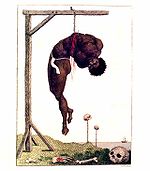
Some Afrocentric scholars prefer the term Maafa to African Holocaust, because they believe that indigenous African terminology more truly confers the events. The term Maafa may serve "much the same cultural psychological purpose for Africans as the idea of the Holocaust serves to name the culturally distinct Jewish experience of genocide under German Nazism." Other arguments in favor of Maafa rather than African Holocaust emphasize that the denial of the validity of the African people's humanity is an unparalleled centuries-long phenomenon: "The Maafa is a continual, constant, complete, and total system of human negation and nullification."
The terms "Transatlantic Slave Trade", "Atlantic Slave Trade" and "Slave Trade" are said by some to be deeply problematic, as they serve as euphemisms for the intense violence and mass murder inflicted on African peoples, the complete appropriation of their lands and undermining of their societies. Referred to as a "trade", this prolonged period of persecution and suffering is rendered as a commercial dilemma, rather than as a moral atrocity. With trade as the primary focus, the broader tragedy becomes consigned to a secondary point, as mere "collateral damage
Collateral damage
Collateral damage is damage to people or property that is unintended or incidental to the intended outcome. The phrase is prevalently used as an euphemism for civilian casualties of a military action.-Etymology:...
" of a commercial venture. Others, however, feel that avoidance of the term "trade" is apologetic act on behalf of capitalism, absolving capitalist structures of involvement in human catastrophe.
Further reading
- The Black Holocaust For Beginners, by S.E. Anderson
- Let The Circle Be Unbroken, by Marimba Ani
- Powell, Eve Troutt, and John O. Hunwick, ed. The African Diaspora in the Mediterranean Lands of Islam (Princeton Series on the Middle East)
- van Sertima, IvanIvan van SertimaIvan Gladstone Van Sertima was an associate professor of Africana Studies at Rutgers University in the United States....
. ed. The Journal of African Civilization. - Rodney, Walter. How Europe Underdeveloped Africa. Washington, D.C.: Howard University Press. 1974.
- World's Great Men Of Color. Vols. I and II, edited by John Henrik Clarke. New York: Collier-MacMillan, 1972.
- The Negro Impact on Western Civilization. New York: Philosophical Library. 1970.
- Quarles, Benjamin. The Negro and the Making of the Americas.
- The African Diaspora in the Mediterranean Lands of Islam by John Hunwick
- Post Traumatic Slave Syndrome by Dr. Joy DeGruy

